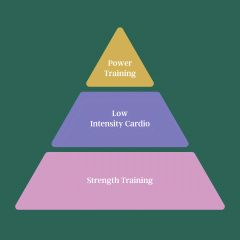They say that half the battle of completing goals is setting the goals themselves. But the other half of this battle is finding the motivation to work towards that goal despite the circumstances.
And not many people are very good in the second half of that battle.
In most cases, people end up giving up or failing, and it’s sad to see that after people put effort into achieving their goals. So, for the people who are struggling, my suggestion is to consider some of the strategies listed below to help with completing goals.
Furthermore, understand why you continue to struggle to complete goals in the first place.
Why Do People Struggle With Completing Goals?
While there are many reasons for not completing goals, it can be narrowed down to a lack of two core things: motivation and patience.
Motivation is your desire to complete things. If you don’t have the motivation, then you’ll get trapped by excuses – excuses as simple as “oh, I don’t feel like doing that today.”
Patience, on the other hand, is to help you out long-term. The goals that you are working towards aren’t usually things that can be achieved in a single day or a week. You have to have the patience that what you’re doing is helping you reach your target. If not, you’ll do something rash and lead to failure.
Patience is something that only you can work on. There’s not really any kind of formal strategy as patience is more of a self-controlled aspect of ourselves.
For example, forcing yourself to wait and figuring out what is making you impatient in the first place are strategies to being more patient.
Motivation though is something where there is a plethora of advice and strategies as motivation stems from different sources. There are many ways for you to achieve your goals, and there is no specific path that you can take.
Strategies for Completing Goals Properly
With this in mind, here are some strategies that you can keep in mind to make completing goals easier and more achievable. There is no one golden standard for how to set goals and complete them, but that leaves room for you to experiment.
Try out these strategies for at least a few months to see where it takes you. From there, begin making adjustments to better tailor your goal-achieving process.
1. Set SMARTER Goals
If there has to be a gold standard for goals, I’d say it’s the SMART goal system. When people talk about goals, the first method that springs to mind is this system. However, people have expanded on that system and have created the SMARTER goal system.
SMARTER is the same thing as SMART. You are still setting specific, measurable, achievable, realistic, and timely goals. But the ER stands for evaluated and re-adjusted.
In other words, after you work on a goal, you go back to evaluate it and then make adjustments to it to reflect that evaluation.
For example, say you’re looking to lose weight and have set a goal to lose about ten pounds in a month. It’s risky, but for some people it can be manageable if you work on your diet and work out plenty. The ER would kick in two weeks into this and allow you to look at your overall progress.
What is going well for you? What needs improvement?
This step in the system can help you in a big way. If you’re in the position you want to be in, you’ll build up more motivation and confidence.
If you’re not, you’ll move to the R and re-evaluate your goal. Maybe you were a little too ambitious and need to be more patient. Why not lower the bar slightly to help you build up motivation?
SMARTER goals are better because there is that check system in place. SMART goals can have that too, but that method focuses more on the characteristics of the goal rather than checking up on it afterward.
2. Remove Bad Habits
The main purpose of goals is for you to remove bad habits, but it’s worth reiterating as bad habits aren’t only focused on one area of your life. There are many overarching bad habits, such as coming up with excuses.
Ultimately, these block your progress and stifle motivation, and they can get frustrating to deal with. But this comes back to exercising patience. This process takes time to work on.
My suggestion is to take the time to identify your bad habits. What habits do you have that you think are bad for you? Write them out and come up with a plan to remove them from your life.
Better yet, replace these bad habits with many good habits. To do this, consider what this bad habit provides you. Every habit covers a need, whether that’s emotional support, a sense of satisfaction or accomplishment, and so on.
Figure out what that bad habit provides and find something similar – but better – that can satisfy the same needs.
3. Build Self-Discipline
Another strategy is to begin building self-discipline. When you have discipline, you don’t have to worry as much about finding the motivation to do things. Even during the early stages, there is a state of mind that you can enter where you won’t have to think about doing a certain task.
You’ll do things automatically without thinking.
A good example of this at work is your morning routine. Every morning, you have a series of tasks you do to prepare yourself during the morning. If you want a more fulfilling morning – provided you’re not happy with your routine right now – you can incorporate other activities. Soon enough, those will become part of your routine as well.
4. Limit Distractions
On top of mitigating bad habits, you also want to focus on having fewer distractions in your life. Some ways that you can limit distractions are to better organize your working space.
Another option to consider is having activities that you can do prior to work or during it to help you get into a flow state. Things like meditation or listening to white noise or soft ambient music can help in those regards.
5. Have Better Management of Your Time
On a similar note to distractions, perhaps you are someone who gets distracted by other tasks. You only have 24 hours in a day, and a portion of that is dedicated to eating and sleeping.
Your time is valuable and you want to be sure that you are spending your time wisely. Keep in mind this doesn’t always mean working all the time. Make sure you strike a balance with your other needs like social and health needs too.
You want to be certain that whatever it is that you are doing at the moment is worth your time. What benefits are you getting from doing a certain activity? What benefits are you getting from talking or being around a specific person?
Remember this benefit doesn’t have to be extraordinary every time, but you want to be mindful so you’re not spending time with those dragging you down or making it too difficult to concentrate. The same applies to activities too.
6. Do the MIT First
MIT. Most important task.
There are many iterations of this, but it’s all the same principle. The first chance you get, you want to be tackling the largest task first. This has a lot to do with how motivation works.
People think that handling smaller tasks first makes it easier to build motivation for bigger tasks. I can see the logic behind this. However, remember that these small tasks still drain your energy.
If you spend all day completing the small tasks that inch you forward towards your goal, chances are you won’t have much energy – and motivation – for the big task at the end.
In most situations, you’re probably going to have the most energy in the morning and so, it makes sense to use that energy on something that demands a lot of it. Later on in the day, you can “power down” by doing all the other tasks that don’t demand a lot of mental or physical strength.
7. Accept Failure
The final strategy that will help you is to accept failure. As much as it’s key to be optimistic, remember that you’re not always going to hit your targets. There will be days where you won’t get everything done or experience a setback.
Don’t worry so much about that and take it as a lesson to improve for next time. Going back to when I mentioned SMARTER goals, you want to apply that in all things in life.
When you experience a delay or you want to note your progress, go and evaluate and make adjustments if needed.
Final Thoughts
Completing goals is challenging and requires a lot from us. You need to work hard, and you need to keep that momentum going.
At the very beginning, it’s easy for us to resist change and slip back to our old ways. That’s okay. Remember that motivation comes from when you’re starting something and continuing it.
Like a boulder rolling down a cliff, if you are practicing these particular tactics, you’ll find it easier to have the motivation and the energy to be completing goals in no time. And there will be nothing that’ll get in your way.
More Tips for Completing Goals
Featured photo credit: Mille Sanders via unsplash.com





























































